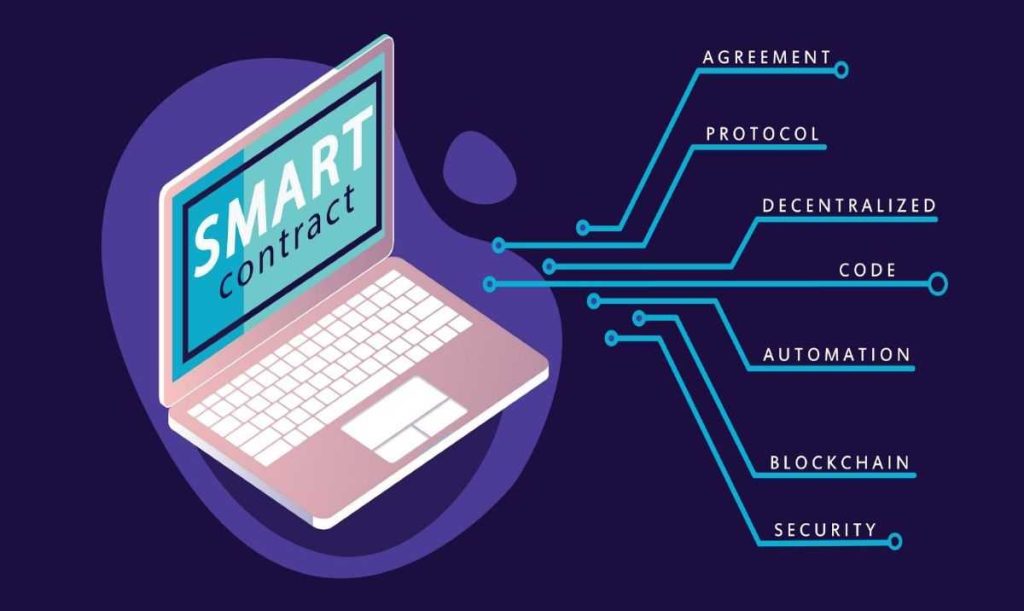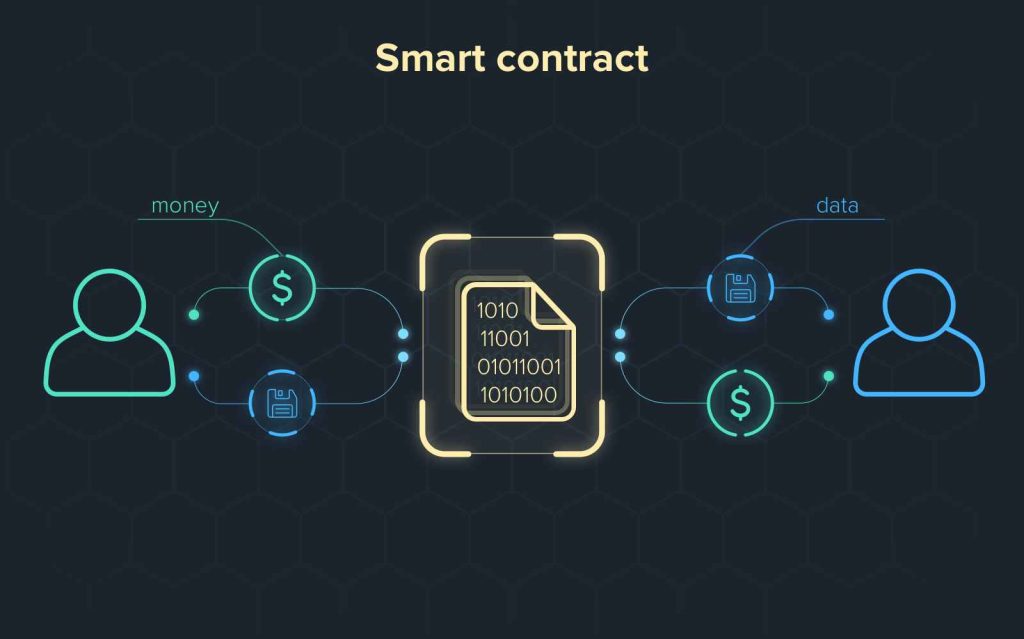The evolution of smart contract technology is changing how we strike deals. Once just a dream, smart contracts now run on networks like Ethereum, making agreements smarter and our lives easier. We used to shake hands; now, we share codes. Imagine your agreements doing the heavy lifting, no middlemen, just trust in the tech. Here’s the real kicker: these digital contracts self-execute, with every term crystal-clear and locked in code. They’re not just for tech gurus; they’re here to reshape industries. In this deep dive, we’ll see how far smart contracts have come and where they’re boldly heading next. Strap in; it’s the future of deals – automatic, secured, and brilliantly transparent.
The Genesis of Smart Contract Technology
Tracing the History of Smart Contracts
Let’s dive into how smart contracts began. In the 1990s, a man named Nick Szabo dreamt them up. He imagined contracts turning digital and smart. But back then, the tech just wasn’t ready.
From Concept to Reality: Ethereum’s Role in Advancements
Years flew by, and then came Ethereum. It changed the game for smart contracts. Ethereum let developers write the rules for their contracts in a language called Solidity. Think of it like a recipe for a cake. But instead of making a cake, you’re making a deal that can think for itself!
Because of Ethereum, we can do so much with smart contracts now. They help artists sell their music directly to fans. They let people borrow money without a bank in the middle. They can even track a fish from the ocean to your plate! Imagine that!
Here’s the cool part: once a smart contract is made, it’s set in stone. It runs exactly as written. It’s like making a pinky promise with a computer that never, ever breaks it.
We also use something called oracles. Oracles are like messengers. They give up-to-date facts to smart contracts. This way, smart contracts can know real-world stuff, like whether it rained today or what a dollar is worth.
Now, lots of folks use smart contracts every day. They are big in DeFi, which stands for decentralized finance. It’s like a money playground where no one is in charge. People lend, trade, and save without banks. It’s all thanks to smart contracts on Ethereum.
When a lot of people want to use smart contracts at the same time, they need to work fast and cheap. That’s what we call scalability. Ethereum is getting better at this. So, more people can play in the DeFi world without waiting or paying too much.
Safety is super important, too. We always keep an eye out for sneaky bugs in the contract code. That’s why smart contract auditing is a big deal. It’s like having a superhero check your homework. They make sure nothing bad will happen when the contract takes off.
Smart contracts are always growing and changing. We learn new stuff and make them better bit by bit. They’re getting smarter, quicker, and safer every day. It’s really exciting to see what they’ll do next!
Here’s what’s great about all this. It’s not just about money and tech stuff. It’s about people making deals with trust built right in. It’s about giving power back to folks, all over the world.
From their humble start to now, smart contracts have come so far. And with bright folks working on it, their future shines like a star!
Smart Contracts in Action: Platforms and Use Cases
Analyzing the Diversity of Smart Contract Platforms
Smart contracts change the way we agree on things. Before, we needed lots of paperwork and trust in others to do business. Now, smart contracts on the blockchain do this job. They’re like robots that follow rules to make deals happen without mistakes. Ethereum was the first big platform for these smart contracts. But now we have more choices. Each platform has its own tools and rules.
Ethereum leads with its language called Solidity. People use it a lot because it was the first to offer smart contracts. It’s like the Swiss Army knife for blockchain deals. But now we also have others like EOS, Polkadot, and Binance Smart Chain. They try to do things faster or with different rules. It’s important because one size does not fit all in the blockchain world.
Exploring Smart Contract Applications Across Industries
Let’s talk about what we can do with smart contracts. They’re not just for trading money. Look at insurance. They can pay you fast when certain things happen. Or in music, artists can sell songs directly to fans and get paid right away. This is huge because middlemen who used to take a cut are out of the picture.
In supply chains, smart contracts track goods from factory to store. They make sure everything is fair and no one cheats. Smart contracts even help in gaming. They can create items that you really own and can trade outside the game.
For people who don’t have banks, DeFi, which stands for decentralized finance, uses smart contracts to let them borrow, lend, or invest just like everyone else. This means more people can grow their money.
Smart contracts also keep your identity safe. Imagine proving who you are without handing over personal details. That’s how smart contracts in digital identity can work.
Think about how great it is when things like paying rent or getting paid for work happen automatically. That’s what smart contracts do. They take care of the small stuff, so we can focus on big dreams.
As we get better at building and using them, smart contracts will touch every part of life. From how we buy homes, to how we vote, to how we prove who we are. And as they spread into more areas, they need to stay safe, work with other systems, and follow the law. That’s where experts step in, making sure every smart contract does its job well.
Smart contracts are an awesome piece of the blockchain puzzle. With the right coding, they can do so much good. By opening up new ways to do old things, they let us dream up a future that’s fair, fast, and full of chances for all.
Enhancing Security and Efficiency in Smart Contracts
The Continuous Battle for Smart Contract Security
We love how smart contracts make deals safe on the blockchain. It’s like a guard for our digital promises. We write rules in code, and the blockchain watches them. But it’s tough, as hackers always find new ways to break in. We keep making our smart contracts stronger to fight them. Each time they try, we learn and fix our walls.
Security in smart contracts is a big deal. Bad code can mean lost money or broken trust. We check our contracts like how parents check for monsters under the bed—very carefully. This means reading every line of code. The code must be bug-free. To keep our money safe, we update our security a lot. It’s like a game of cat and mouse.
A big part of this is smart contract auditing. Think of it as taking your car to a mechanic but for code. Experts look at the smart contract to spot any problems before it goes live. This step is so important. It can stop big trouble before it happens.
The Drive Towards Smart Contract Optimization and Automation
Smart contracts shouldn’t just be safe. They must work fast and cost less too. That’s our goal when we build them. Efficiency is the name of the game. We use languages like Solidity to write them. This language keeps getting better, which helps a lot. And we use tools that check the contracts to see they do their job well.
We also work on making smart contracts do things by themselves. This means they run without people saying “Go.” It’s great because it saves time and money. No more waiting for a person to push a button. Do you like instant things? That’s what we aim for.
And it’s not just buying and selling stuff. We use smart contracts in games, insurance, and even voting. They are everywhere!
Smart contracts have done a lot for DeFi. DeFi stands for “decentralized finance.” It’s like a bank without the actual building. People lend, borrow, and trade money without waiting in line.
Ethereum is a superstar for smart contracts. It’s where most of them live. It helps them talk to each other and work smoothly. Even though it’s popular, Ethereum keeps changing. This is good. It means it can handle more people and smart contracts without slowing down.
In the end, we want smart contracts to be like good friends. Always there, reliable, and not costing you much. The goal is to have contracts that anybody can trust, whether you’re a big company or just a person with a phone. We’re getting there, making each contract a bit better. It’s an exciting time for people like me and for anyone who uses them.
Smart contracts are changing the world one line of code at a time. The future is smart, and it’s built on strong, fast, and clever contracts that do their job without fuss. That’s what we keep working for every day.
The Horizon of Smart Contracts: What’s Next?
Emerging Trends: Interoperability and Beyond
In the world of tech, things move fast. And smart contracts? They’re at the heart of it all. I have been knee-deep in smart contracts for years now, and the leaps we’ve made blow my mind. Now, what has my full attention is interoperability—how smart contracts talk across different systems.
Think of it like sports teams trading players. It’s no good if a player can’t fit into the new team. Smart contracts now aim to play nice with each other, even on different blockchains. More than that, they are starting to work outside the blockchain using what we call oracles. They fetch info for the contract to make smart choices.
This chat between contracts opens a whole new world of apps and services that can link up. It’s like making friends in the digital world, and it means faster, better ways to do things. And with blockchains teaming up, we can make bigger, bolder moves.
Regulatory Landscape and the Future of Digital Contracts
Now let’s talk rules—that’s regulatory stuff. Laws keep things safe and fair, but tech changes fast, and laws take time to catch up. For smart contracts to really take off and be secure for everyone, we need clear rules. It’s like playing a game. Everyone needs to know what’s a foul and what’s a home run.
Governments, lawyers, and tech folks are now talking more. Their goal? Set laws that work for everyone in the digital world. They look at how these contracts are made, used, and kept safe. They also ensure the people using them know what they’re getting into. It’s all about trust.
This chat between the decision-makers is shaping the way you and I will make deals and manage our digital lives very soon. It’s exciting to see paper contracts become smart digital ones. And as they get smarter, they will handle more complex tasks on their own. With every new law, smart contracts get closer to being a reliable part of our day-to-day.
Each step we take in the world of smart contracts, whether it’s making them talk to each other or fitting them into our legal system, moves us ahead. It’s like a game of leapfrog—but we’re all leaping toward smarter, faster, and safer tech. And as someone who loves to push the envelope, I can’t wait to see where we land next.
There’s plenty more to come, and sticking with me, you’ll be the first to know how smart contracts will change the scene. Together with Ethereum, new programming languages, and a world that’s keen on digital, the future of contracts isn’t just smart—it’s brilliant.
In this post, we journeyed through the rise of smart contracts, from their early days to their role in today’s tech scene. Remember, smart contracts started as a seed of an idea and have now grown into a vast forest of platforms, touching many industries. Ethereum helped turn a concept into a tech revolution, changing how we deal with contracts forever.
We saw how diverse platforms use smart contracts and how they shape business across sectors. These digital contracts are not just lines of code—they’re tools making deals safer and tasks quicker.
Yet, this tech is still in its youth. We must keep our guards up, fighting to make smart contracts more secure day by day. At the same time, the industry strives to make smart contracts smarter, working on their own without us needing to check on them.
Looking ahead, smart contracts will keep evolving. They’ll learn to work with different systems, and we will need rules that keep up with this change.
As an expert watching these trends, I see an exciting future for digital contracts. They’re set to make our lives easier, provided we navigate the path ahead with care. Stay tuned, stay smart, and embrace the smart contract era with open arms.
Q&A :
How has smart contract technology evolved over time?
Smart contract technology has undergone significant transformation since its conceptualization. Initially tied to the notion of digital vending machines by Nick Szabo in the 1990s, it wasn’t until the advent of blockchain platforms like Ethereum that smart contracts gained practical functionality. The evolution has seen improvements in security, efficiency, interoperability, and complexity, allowing smart contracts to execute more intricate agreements and interact with other contracts and even off-chain data sources via oracles.
What are the key developments in smart contract technology?
Key developments in smart contract technology include the creation of standard frameworks for contract creation like the ERC-20 and ERC-721 token standards. There has also been a focus on mitigating security risks with advanced auditing practices and new programming languages, such as Solidity, designed specifically for smart contracts. Layer-2 solutions and sidechains are advancing to improve scalability and transaction speeds. Additionally, new blockchain platforms are emerging to offer various smart contract capabilities tailored to specific industries.
In what ways are smart contracts becoming more user-friendly?
Smart contracts are becoming more user-friendly through the creation of more intuitive user interfaces and the implementation of no-code or low-code platforms that simplify the contract creation process. Improved documentation and educational resources are also making it easier for non-developers to understand and leverage smart contracts. Additionally, projects are focusing on reducing the barrier to entry with tools that automate the coding of smart contracts or templates for common use cases.
What role do smart contracts play in decentralized finance (DeFi)?
In decentralized finance, smart contracts are the foundational building blocks that enable the creation of decentralized applications (dApps) for lending, borrowing, trading, and asset management without the need for traditional financial intermediaries. They enforce the terms of financial agreements on a blockchain network with transparency and without counterparty risk. Their self-executing nature allows for automated, trustless transactions, which is a core component of DeFi platforms.
How does the integration of AI and IoT with smart contracts point to the future of the technology?
The integration of artificial intelligence (AI) and the Internet of Things (IoT) with smart contracts indicates a shift towards more autonomous and dynamic contract functionality. AI can facilitate decision-making processes, optimize contract terms in real-time, and provide predictive analytics, enhancing the capabilities of smart contracts. IoT devices can trigger smart contract actions automatically based on real-world data, expanding the use cases into areas such as supply chain management, environmental monitoring, and more. This convergence of technologies represents a significant leap in how smart contracts can interact with the physical world, making them increasingly intelligent and responsive.





RELATED POSTS
Kelp DAO Airdrop – How to Earn Money from Kelp Miles
The Kelp Miles program within...
Unveiling the Audit Firm Rivalry: A Critical Service Showdown
Comparing audit services: Big Four...
Blockchain Security Audits: What’s Under the Microscope?
What do Blockchain Security Audits...
Grindery Airdrop – Earn G1 and GX Tokens Easily!
Grindery airdrop, supported by Binance...
Cost of Crypto Hacks: Are Your Investments Really Safe?
Understanding the financial impact of...
Naoris Protocol Airdrop: Get free NAORIS Tokens
Naoris Protocol is an advanced...
The Benefits of Conducting Blockchain Audits for Secure Transactions
Gain transparency and trust with...
Can you short on Coinbase Pro?
Can you short on Coinbase...
Explore Top DePin AI Projects
Exploring the leading DePin AI...
Future Of Consensus Mechanisms In Blockchain: Unlocking Next Evolution
The Future of Consensus Mechanisms...
Blockchain Breakthroughs: Latest academic papers on blockchain technology
Discover the Latest Academic Papers...
Blockchain For KYC/AML: Streamlining Compliance For The Future
Blockchain for KYC/AML: Revolutionizing compliance...
Stable Coins Demystified: Your Essential Guide to Crypto Stability
What is a stablecoin? Explore...
Memefi Coin Airdrop: Airdrop Timeline and Launch of Memefi Token
The Memefi Coin Airdrop presents...
Cryptocurrency Ro Khanna and the future of regulation
Discover how cryptocurrency ro khanna...
Messari Crypto: A powerful tool for investors
In the world of cryptocurrency,...